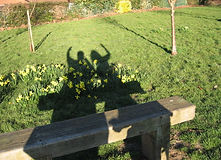Teacher and Writer
ASTRID SEELE

ON FRIENDSHIP
And what a complex topic it is. It is hard to define what friendship is and what it is based on – a shared purpose? Shared values? Shared hobbies? The same sense of humour? The same choice of tipple? The same favourite authors? Or, to the contrary, do opposites attract? History and literature are full of such examples – Winnie-the-Pooh and his timid but loyal friend Piglet maybe, or the unequal pair George and Lennie in Steinbeck’s novella Of Mice and Men.
There are different types of friendships: the school friends or colleagues with whom we work towards shared educational or professional goals; the friends with whom we share hobbies and who become comrades in rowing teams or mountaineering expeditions; the friends who (wherever we may have met them) gain an importance for us that transcends their immediate usefulness.
Trust is important in all these types of friendship, but few pleasures are as pure as the intrinsic one of spending time with a like-minded person, indulging in philosophical conversation during a walk or over a meal and feeling safe in the knowledge that you can be yourself without fear of being judged – or if you are judged, to be judged gently and with your best interest at heart.
It is this aspect of judgement in true friendship that I would like to focus on today, although I will undoubtedly return to some other aspects of this fascinatingly complex topic in future blogs. There is a famous proverb (I am not sure who said it first) that love is blind, whereas friendship closes its eyes. In other words: lovers genuinely do not see the faults of their beloved, whereas true friends see each other’s flaws very clearly, but gently tolerate them.
Where these flaws affect us ourselves, at times this process can require immense self-restraint and forgiveness on both sides, but where a friendship is based on the right foundation and principles, the effort in restraining ourselves and tolerating or forgiving our friends’ faults is worth it. As Seneca so rightly said: people who judge someone after they have made them their friend, instead of before, do things the wrong way round. “When friendship is settled, you must trust; before friendship is formed, you must judge.” (Epistulae Morales I.3).
In a striking resemblance to the biblical saying that we are trying to take out the speck of our brother’s eye and failing to see the plank in our own, the Roman poet Horace puts it like this: “When we consider our own faults, we accidentally blind our eyes with a smear of ointment, but viewing our friends’, we are as keen-eyed as eagles.” (Satires I.3).
He even pre-empts the proverb of the lover’s blindness: “Think of the case of a lover in all his blindness who fails to see his darling’s ugly blemishes. (…) I wished we erred in the same way with our friends, and morality gave such errors a decent name.”
And in his characteristic spirit of tolerance, tempered with gently self-deprecating humour, Horace continues: “No man alive is free of faults: the best of us is him who’s burdened with the least. If he desires my love, my gentle friend must, in all fairness, weigh my virtues with my faults, and incline to the more numerous. Assuming, that is, my virtues are the more numerous! And by that rule I’ll weigh him on the same scale. If you really expect a friend not to be offended by your boils, pardon him his warts. It’s only fair that he forgives who asks forgiveness for his faults.”
28 August 2016
When teaching in Italy in the 1990s, I introduced the topic ‘friendship’ to my Year 10 philosophy class. They embraced it enthusiastically – I remember one of the girls exclaiming: “Che bello!” We had some remarkable discussions, starting from examining isolated quotes on friendship to analysing some more complex and theoretical treatises on the topic.

I think the world would be a better place if we all took these words to heart. It is comforting (and worth putting the effort in) to have some trusted, trusting, forgiving and forgiven friends, with whom we can sail the troubled waters of life and who, like the trusted old ferry Friendship on our Sydney harbour crossings, will help us keep a steady course on the journey.

Further thoughts on friendship, especially on the difference between proper and utilitarian friendships, can be found here.